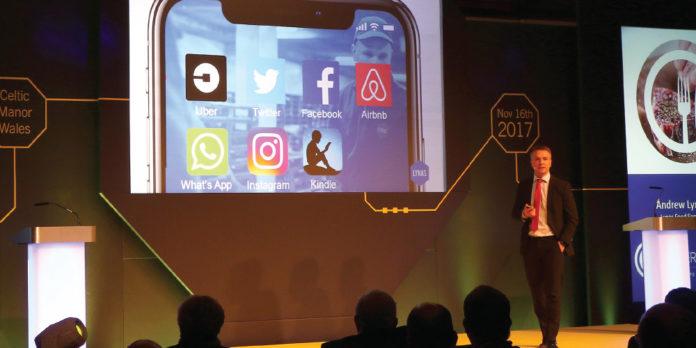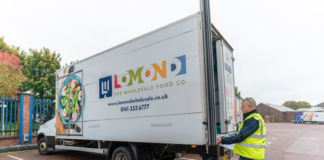Despite the Booker/Tesco merger, all was calm at Caterforce’s conference, Martyn Fisher found.
The 2017 Caterforce conference took place in the week the Booker/Tesco merger was given the provisional go-ahead by the Competition and Markets Authority.
The scene across a sizeable portion of the wholesale channel was akin to the climax of a James Bond film, with 007 having penetrated the villain’s lair and triggered some sort of self-destruct mechanism. Yet the managing director of the eight-member buying group, Nick Redford, was stoical about any threat the deal may pose to foodservice wholesalers.
His thoughts were echoed by Kathryn Jones, director at leading Welsh wholesaler Castell Howell Foods, who said: “I am not worried about Tesco at all. Can Tesco send out a development chef to a local pub struggling to make its menu work? No. The support wholesalers like ours can give our customers works – and goes a long way.”
While acknowledging that advice from retail wholesale with regards to the aforementioned tie-up would be to “hold onto your hats”, Redford and Caterforce purchasing director Gary Mullineux focused on the positive achievements made in the two years since the last conference by the group and its UK-wide, regional powerhouse wholesaler members: Castell Howell, Hunt’s Foodservice, KFF, JB Foods, Lynas Foodservice, Philip Dennis Foodservice, Pilgrim Foodservice and Pioneer Foodservice.
Market conditions remain favourable for foodservice wholesalers. MCA Insight research shared at the event, staged at the luxurious Celtic Manor Resort in South Wales, showed that the eating-out market has gone from being a £77.9bn industry in 2010 to a £87.6bn industry in 2017.
MCA’s data shows that the £20bn restaurant market remains the biggest concern. However, street food is the second-biggest channel in the eating-out market in terms of growth – albeit with a value of only £1.1bn.
Addressing delegates, Mullineux noted that Caterforce was on course to post a turnover of £547m in 2017, up 28% on 2015. By 2019, Caterforce’s members are set to have boosted buying power by around £84m.
Mullineux’s aim is to elevate the business into becoming a £1.2bn entity, which he believes is an achievable target if the group replicates its strong share of frozen in other temperatures, which is the goal of the group.
For Redford, data needs to underpin everything Caterforce’s members do. He said: “We have to get to know our businesses and customers better through the medium of data. Data is the dynamite to help us enable growth. Accurate and actionable data is key, and we have to look more at ‘sales out’ data, like retail.”
In addition, Redford cited the importance of continuous innovation, but not just at the granular level of “what the next big salted caramel product is going to be”.
He also stated his belief that data and innovation, in its cultural, social and technological forms, are the enablers of service, which in itself is “the USP of foodservice.” He added: “If your USP is price, you will die. But growth is in our hands, despite the difficulties in our circles of concern.”
Meanwhile, Jones gave an inspiring presentation about attempting to renew Castell Howell’s supply deal with Celtic Manor. Jones, who had built a strong personable relationship with buying staff at the resort, put in an enormous amount of work to drive down prices for her customer, while at the same time protecting one of her dairy suppliers, a family business that had been struggling with worsening milk returns.
The fierce loyalty Jones and Castell Howell showed in looking after both a small but important supplier and Celtic Manor simultaneously led to the wholesaler winning the deal, which comes at a critical time as Celtic Manor is set to open a major new conference centre next year.
The event also heard from Hunt’s operations director Thomas Hunt, the fifth generation of the Hunt family to work at the West Country-based wholesaler.
Talking about the journey Hunt’s has been on, he told delegates: “If you are not investing in your business, you are moving backwards. We were there 10 to 15 years ago, but then we changed our structure and management team, invested, and moved forward as a result.”
Hunt spoke about the importance of investing in tools such as Doctech, Tableau and Kronos, and revealed that Caterforce members plan to spend £46.4m on technology going forward: “It is a positive that we are committed to investing back into our businesses,” Hunt noted.
Closing the event was the effervescent Andrew Lynas, director of Northern Ireland’s Lynas, who sought to challenge the delegates. “Once we have been in the industry for a year, we start to think the same,” he said. “You cannot learn if your thinking and assumptions are based on the past.”
One of the chief themes of Lynas’ presentation was the importance of culture. He said: “Culture is the foundation of everything. Culture leads to growth and in the words of [business guru] Peter Drucker, ‘culture eats strategy for breakfast.’ It sounds fluffy, but it does matter to Caterforce.”
Following on from Hunt’s presentation, Lynas reiterated the importance of technology, particularly the smartphone.
“We want our customers to be more profitable and a lot less of them argue about price when they are successful,” he said. “We have to help them build a better business and we have to make sure that they can do this through their smartphones.”
Lynas highlighted Caterforce members who had made impressive moves in recent years. Pioneer, in Cumbria, had had a “perfectly successful food hall, but aspired and moved to build it bigger and better”. Meanwhile, Lincolnshire’s Pilgrim has made a major investment in a new butchery operation, to boost capacity and stand out from the crowd.
Caterforce is firmly focused on the future. But Norman Lynas OBE, of Lynas, and Brian Jones MBE, of Castell Howell, were presented with special awards for their services to the industry over several decades. A fitting end to another successful conference for one of the UK’s fastest-growing buying groups.








